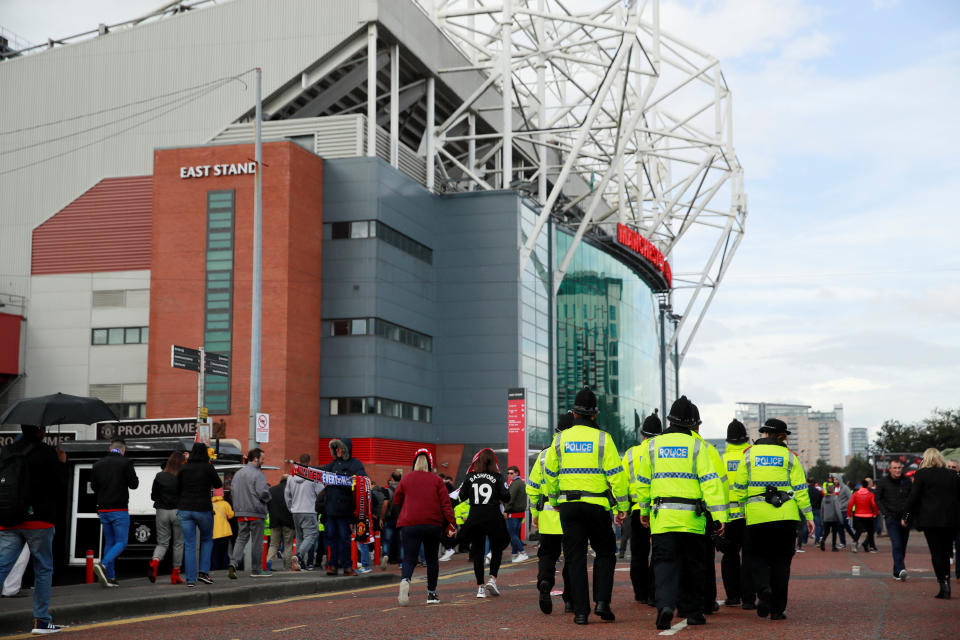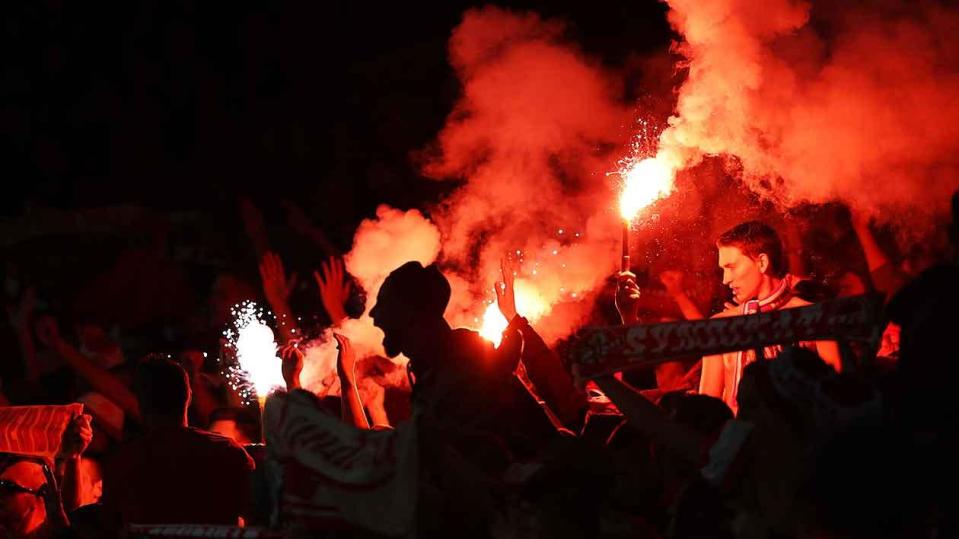Why progress in the policing of British football is worthy of our praise

Anyone who went to away games in the 1980s will attest that it could often be a menacing experience and it wasn’t only the home support that greeted you with open hostility. To many police forces across the UK – and indeed going right up to the government of the day – you were regarded as a hooligan until proven otherwise, a second-class citizen corralled, shoved and ill-treated from the moment you stepped off the rickety Football Special train to the relief of reaching home.
Those days are thankfully long gone now; a different time sepia-tinged in society’s memory and in the family-friendly era of modern-day football police provide a largely benign presence, there to ensure public safety; non-confrontational and commonly approachable.
Of course some of this is necessary perception. We might like to believe that the spectre of hooliganism has been vanquished but the sad reality is there will always be a small minority with a propensity for trouble and the fact that you and I can take our children to matches and feel completely safe is down to advancements in policing that has negated such threats.
The widespread deployment of CCTV along with intelligence shared with clubs from officers known as ‘spotters’ have each proven to be an invaluable resource and the results from this overall more methodical approach – along with a sophisticated working model for policing games that includes vastly improved co-ordination between the Transport Police, local force and club stewards – have been encouraging with the number of arrests dropping significantly across England and Wales, from over 3000 in 2010/11 to under 2000 in 2014/15.

Banning orders similarly nearly halved during that time period while a former officer for the Metropolitan Police with nearly ten years’ of service told me he dealt with only two violent incidents from the countless games around north and central London on which he was on duty.
Through a combination of the gentrification of the modern game and hands-off, clever policing the match-day experience of today then is a largely pleasant one, and certainly more relaxed and smiley than the generation before us could ever have imagined. Yet as far as the policing of games is concerned any actual disturbances that took place ‘back in the day’ were only ever part of the problem for the vast majority of fans who would never dream of causing mayhem. As alluded to at the top the issue was also attitudinal and what rankled – and consequently created a harmful divide between the authorities and supporters – was an ‘us v them’ mentality that was clearly prevalent.
READ MORE: FIFA 18 career mode budgets uncovered
READ MORE: Most explosive manager meltdowns
READ MORE: Poch’s wife jealous of Kane ‘love affair’
This has been addressed in the intervening years and it’s pertinent that all five of the officers I spoke to prior to writing this are match-going supporters themselves. In 2012 the Football Supporters Federation insisted that though hooliganism was on the wane policing remained ‘disproportionate and overly aggressive’ and the organisation asked for officers to be trained in ‘fan culture’ intimating there was still a lack of understanding and detrimental distance between the police and those they were in the duty of care to protect.
The police listened, lessons were learned, and those lessons were acted upon. Football Liaison officers were introduced, first in Nottinghamshire, and then extended across the country and though their establishment is hugely welcomed it still doesn’t wholly over-ride the suspicion that fans are viewed as ‘other’; as the enemy. It is extremely encouraging then to hear a present serving officer describe a typical start to a match day: “It is really emphasised to us on briefings that most of the people attending are lads and dads and families just wanting to enjoy the footie, and we want to ensure they do so safely. So what the bosses want is for us to not appear arms-folded looking at everyone like they’re a hooligan, and to speak to people and engage with them. I would guess that the message in a briefing in the 1980s would be a little bit different”.
The balance between touchy-feely, progressive policing and the requisite austerity when overseeing thousands of people – some eight pints in, others tribal and fuming from a dodgy refereeing decision – in and out of a football stadium is a difficult one to pull off and is not quite there yet. The use of camcorders to record fans remains a divisive issue and at Bournemouth recently Manchester City fans were appalled to find themselves filmed simply for celebrating a last minute goal while the highly contentious ‘bubbling’ persists, a technique designed to shepherd supposedly troublesome groups to the ground. Yet overall – and it is appreciated just how expansive and generalising that simple word is – the regulating and supervising of matches in British football has improved immeasurably in recent years in tone, method and execution.
We have already seen this gradual shift towards more progressive policing work admirably on three different occasions this season. In a pre-season friendly at Burnley visiting Hannover supporters ripped out seats and attempted to attack the home fans situated in the Cricket Field Stand. So severe was the disturbances – and so clear were their motives – that the police and club took the unusual step of abandoning the game at half-time. Once extra resources were drafted in the away contingent were escorted from the ground to ensure no further disorder took place while the Burnley faithful walked home peacefully and safely.
At Goodison Park in mid-August tempers flared as Hajduk Split fans tried to get over the advertising boards and onto the pitch. Missiles were thrown into the Park End where the home booed back their disgust. The game was briefly halted as police formed a barrier and awaited the flashpoint to fizzle out.
This month’s Arsenal v Cologne Europa League fixture meanwhile was postponed for an hour as seven times the amount of away supporters who had allocated tickets infiltrated the home sections. There were fireworks set off and reported crowd disturbances, with the chair of the Arsenal Independent Supporters Association later saying it was a ‘dangerous throwback to a bygone age’.

From all three of these incendiary situations that could easily have resulted in unimaginable consequences only six arrests were made with no public record of any supporter harmed or injured. Is it any wonder that Russian police have recently sought advice from their English counterparts ahead of next year’s World Cup on how to ably curtail flare-ups with the minimum of fuss?
The media’s response to all three instances rightfully praised the tolerance of Burnley, Everton, and Arsenal supporters and there is no question that had the home fans reacted aggressively – particularly at Turf Moor and Goodison where the mood was openly antagonistic towards them – the depressing scenes could have swiftly escalated. Deserved praise for the police however was nowhere to be seen even from the right-wing sections of the press who traditionally kowtow to authority. Why was this? Is it because they are still viewed in many quarters as ‘other’? The enemy?
Whatever the reason it can be concluded that when the police fail in their duties they are damned accordingly yet when they excel they are merely doing their jobs. This is quite patently unfair and especially so when a simple hypothesis is offered up: how would the three examples above have played out differently had they taken place on the continent?
In 2007 Seville police baton-charged Spurs fans under no provocation with the club soon-after releasing a statement that read: “Reports suggest there was no fan-to-fan fighting at any stage of the proceedings. As such we are seeking explanations as to why the police reacted in the way they did”. Just 24 hours earlier Manchester United supporters were at the mercy of indiscriminate attacks from the Rome paramilitary police, attacks of such unprovoked brutality it resulted in the Manchester United Supporter’s Association (Imusa) pursuing legal action. In 2012 a large group of Manchester City fans in Madrid were enjoying the sunshine and having a drink with locals when riot police swooped, batons at the ready. “Women, kids, teenagers, all treated like scum,” a club match-day presenter who was present tweeted. It was a similarly disgusting tale in Lille in 2014 for travelling Evertonians who were subjected to tear gas for peacefully inhabiting a town square and staying with Everton their return leg to Hajduk Split in August revealed a sharp contract to the quality of policing shown at Goodison a week earlier. In Croatia upwards of fifty Blues were breathalysed at the gate then slung in jail until they paid a 200 euro fine. That day they had been kept in a fan park with alcohol served from 7am onwards.
Such examples are sadly commonplace and far surpass the description of heavy-handed. Indeed so systematic is the ill-treatment of English fans abroad that when a friend informs you he’s travelling to another country to watch his team your initial response is to urge that he remains safe throughout.
READ MORE: Fabregas never considered Chelsea exit
READ MORE: Alexis Sanchez mocked by Arsenal team-mates
READ MORE: Rooney could star in Angry Birds game
READ MORE: Henry picks his top Premier League striker
British police officers in attendance at football matches should not only be measured against their European counterparts of course against whom they increasingly appear lightyears ahead of in both procedure and outlook. They should also be gauged against their former selves. Here too they have shown significant advancements and all, lest we forget, while having their budgets slashed with the constant threat of terrorism as a consideration.
Recent years has seen arrest rates plummet, games that used to require having your wits about you becoming safe environments, while – though it may seem a minor point it’s really not – there is now a prevailing feeling that the bobby in a florescent jacket is present for your well-being and not there to police you.
Improvements are still needed, that there is no doubt but it’s equally true to state that important and immensely encouraging progress has been made with an emphasis now on conversation over coercion; of diffusing situations rather than worsening them. Not that you’ll hear about this in a great many places: acclamation for the police will perhaps always remain not the done thing. But if outright praise is always going to be beyond us isn’t it at least time that we started to give some credit where it’s due?

 Yahoo Sport
Yahoo Sport 







































